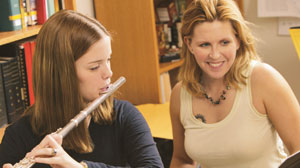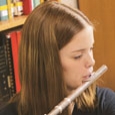 September is a time of new beginnings. Some pre-planning and basic organizational skills will help you make the most of the upcoming school year. While most of these suggestions are directed to college students, high school students can benefit from putting these ideas and goals into practice as well. You will be better prepared for college when the time comes.
September is a time of new beginnings. Some pre-planning and basic organizational skills will help you make the most of the upcoming school year. While most of these suggestions are directed to college students, high school students can benefit from putting these ideas and goals into practice as well. You will be better prepared for college when the time comes.
Just Before School Starts
A few weeks before the start of school, email the teacher and ask what materials are required for fall study. For music, ask the teacher’s preference for editions. The cheapest or the most expensive copy may not be the best choice for you. Do not bring photocopies to your lessons. Do not ask the teacher if you may copy his music either. Promptly order the music so that everything is available at the first lesson. It is also an excellent idea to study recordings of the new repertoire before the first lesson. Do some preliminary research on the lives and style periods of the composers you are performing. The more familiar you are with what you are going to study, the better the final results.
Music Storage
Music is expensive. Many of the pieces you study in college will be ones that you perform many times in the future. Take care of your music so it stays in good shape. Use a bag to carry the music to practice and lessons and find a good place to store your music when it is not in use. If you have the space, a legal-sized file cabinet is best, but many dorm rooms are small. Consider purchasing a file box from a local moving company. These inexpensive (less than $5) boxes are made for storing files and are stronger than normal packing boxes. The lid is detachable and the whole box easily fits under a bed or into the trunk of an automobile for carrying home at the end of the term.
Designate one bag for your flute studies and another for your academic studies. Most schools offer locker space to store bags and coats. Flute bags, which have a place for your instruments and music, are available online or at flute stores. Most have special pockets to hold a metronome, tuner, recording device, music dictionary, and writing equipment. If the practice rooms don’t have mirrors or music stands, you will need a place to accommodate them as well. Because you will be carrying this bag around for at least the next four years, choose one that has wheels or that you can carry on your back to evenly distribute its weight. Carrying a bag on one shoulder is not good for body alignment.
Respect Your Teacher
Teachers are busy people, and you should respect their time. Most have a full studio of students, conduct a flute choir, and teach a weekly masterclass. They may also teach another subject, such as music theory or music history, besides having an active performing career. Arrive early for lessons. In the music world, early is on time. A changing work schedule on your part should not affect your flute lessons in any way. Do not expect a make-up lesson if you forget a lesson. If the teacher must miss a lesson, then a make-up lesson is in order. Plan ahead. If you have a valid problem, change lesson times with another student in the studio. Inform your teacher of this change, either by email or a note in his mailbox.
Dress professionally. During the first week of my freshman year at the Eastman School of Music, Howard Hanson, the American composer and Director of the Eastman School of Music, hosted a banquet for all incoming freshmen. Along with many of his eloquent thoughts, he said: You have chosen music as your life’s passion. Have respect for the art. Bring your best to the subject. This means dress up for your classes and for concerts. Good advice!
Lesson Manners
At the beginning of each lesson place all the music on the stand so the teacher can see what you are studying and how to structure the lesson. I have had students place one book on the stand. After working on it, I asked: what else do you have? Then another book was placed on the stand, and we work on it. It never felt that we accomplished as much as we did when students placed everything on the stand to begin with. To progress, make the most of your 70 to 112 hours of applied lessons.
At the beginning of most lessons and classes, teachers ask if you have any questions about the material being presented. There are no stupid questions. Every teacher wants to know how you learned the material and whether you had any problems. If you have questions, don’t wait until the last five minutes of the lesson to ask them. Most questions take time to answer well. Waiting to catch a teacher between lessons or classes is not being respectful of the teacher’s or a waiting student’s time.
Most teachers have posted office hours when they welcome drop-in visits. If you are having difficulty in a course, go see the teacher. Sooner is always better than later. Teachers have many resources available to help you become a successful student. These include tutoring services or study skill labs.
You are paying tuition to learn. Listen to your teacher. Do not argue with him. Keep an open mind, and try new ideas. Recently I reread a 1962 diary entry based on a lesson with William Kincaid. At the time I wrote the entry, I did not understand his idea, but I wrote it down anyway. However, 40 years later, the concept was clear as a bell to me. This frequently happens in education.
After your lesson/classes, write your assignments in a journal, which you should keep for lessons and practice. Note any questions or successes. Teachers love to hear about successes as well as problem areas!
Social Graces
Do not call your teacher at home. Teachers have lives also, and after a long day at work, they deserve uninterrupted time with their families. If you call, do so during office hours. Many teachers put office phones on voice mail while teaching, so leave a concise message with a call back number. Some teachers prefer email or text messaging. This is something to discuss at an early lesson.
Do not expect a teacher to become part of your social network. Studio parties (where everyone is included) are a great way to bond a studio together. However, private dinners or coffee breaks with a teacher are not part of the norm. If you feel uncomfortable in a situation, then there probably is a reason for alarm. Both the teacher and student should plan on socializing with their own peer groups. If you find yourself in a difficult situation with a teacher, discuss the problem with your parents or a university advisor.
What Courses To Take?
High school students should meet with their guidance counselor to ensure that they meet the course requirements to graduate on time. If possible, check the entrance requirements for the university that you plan to attend. Be sure that you have fulfilled these obligations also. If possible, try to complete as many Advanced Placement courses as possible in high school, so that you can fulfill the general goals of the university. Having these courses out of the way will provide more time for your music studies and practice time. Many of my most successful college students have entered with most of the general course requirements fulfilled by way of Advanced Placement courses in high school.
Go see your advisor. Sooner is better than later. Listen carefully when the advisor explains your curriculum. Most advisors have a printed handout that lists the courses you should take semester by semester. Follow the schedule to ensure that you graduate on time. Students often put off taking dreaded difficult courses until their final semesters only to find that the information in these classes would have helped in many other courses.
Many students are disappointed to learn that they will be unable to student teach because they never passed the piano proficiency exam. In most schools the catalog or bulletin that you use when registering for the first term is the one that you will follow to fulfill graduation requirements. Changes that are put into place after you have begun study usually will not affect you. Register on time. Pre-register as soon as allowed so that you get the first choice of classes to fulfill your degree requirements. Pay your bills. Clear up any library or parking fines. Be professional in the way that you handle your financial affairs with the university and in your personal life.
Once school begins, keep an appointment calendar and check it often. Each day will be on a different time schedule. Attend classes. You or someone is paying for you to be there. Spend your money wisely. Plan your study and practice time. Remember that a regularly set practice time each day, will help you remember to practice.
Do not wait until the last moment to practice for juries or study for exams. Cramming generally assures that you will forget at least half of the material during the next six months. Develop a comprehensive studying program so that you receive an education for a lifetime.
Auditions
Check the music school’s website for a list of performing organizations. Most ensembles post audition dates and requirements before the term begins. Often audition music is available to download for practice. Follow the directions carefully. Sign up early for an audition time and be punctual for the appointment. Be prepared to play what is expected. Play at a level to make it easy for them to select you. If you are flying in, carry instruments and audition materials with you to ensure that lost luggage will not affect your audition success. Dress professionally. Remember good manners are always an asset.
Audition Results
If you succeed in the audition, take the assignment seriously. As a freshman, do not expect the best parts. In most situations, you still have to earn the respect of the teacher and conductor. Do not gripe about your part assignment. It will only label you a trouble-maker. Busy people do not have time to deal with difficult students.
First Rehearsal
Arrive early, warmed up, and with the music learned. Music preparation includes the right notes, at the right time, in the marked tempo, and with the correct style. Preparation on your part should include score study as well as listening preparation. CDs and online (youtube) performances are valuable assets. In an advanced group, the director will not take the time to teach you notes or rhythms. That is your job. Mark (in pencil) any instructions offered by the conductor. Help make rehearsals run smoothly and quickly. Do not talk to section members when the conductor is issuing instructions to others.
Be someone others can count on. Respect the music librarian’s rules. Keep the music in the folder in a safe place. If you miss a rehearsal, make arrangements to have someone bring your music, so someone else can play your part. Never mark music with a pen. Erase markings from your part after the final concert. Check the librarian’s rules about where to leave the music after the concert. Whatever you do, do not take the music home after the final concert, which will require someone to call to ask you to bring it back. Much of today’s instrumental music is on rental. Delaying the return of the music to the publisher is expensive for the organization. Do your part to keep expenses in check.
Check The Call Board/Email
Many schools have a bulletin board that lists announcements for ensemble rehearsals and class schedules. Check the board frequently for any notices and updates. Return phone calls and email messages promptly. When a well-known orchestral personnel manager was asked which substitute he hires, he said: the one that answers and returns my phone calls.
Other Tips
• Check on scholarship updates.
• Take enrichment courses such as Pilates, yoga, etc.
• Network with peers and other other professionals.
• Be on the alert for internships and summer music programs.
• Get enough sleep, good food, and exercise.
• Consult your career counselor.
• Check in with your parents from time to time.
• Stick to a budget.
Develop Yourself
Most musicians today will teach sometime during their careers. In order to become a fantastic teacher, get some experience. Good options for teaching opportunities include youth conservatories, public school programs, and music stores. Your first teaching encounter may be volunteering in a school program. This is an excellent way to develop your talents and also make valuable contacts for future employment.
Organize a small chamber ensemble to perform for weddings and receptions. Make cards advertising your ensemble and post the cards around the campus, at music stores, with wedding-planners etc. to promote your group. Many universities have job placement centers that may aid in your development. Besides making extra cash, you will be honing your performance skills and building your resume.
Check The Resources
Most universities have excellent libraries and listening laboratories. Become a regular patron. Check out scores to accompany the CDs and videos. Remember listening is also a part of practicing.
Check out the professional performance concert series. Tickets are usually less expensive for students than for the general public. This is your opportunity to observe some of the great performers of our time. If the performer offers a masterclass, attend. It does not matter if you play the instrument or not. Music is music. I have learned the most about musical pacing from piano and string masterclasses.
Do attend your fellow students’ concerts and recitals. Not only are you being supportive of their work, but you will learn a broad range of musical repertoire. The more you know, the better you will become. Attend all studio functions. Your teacher has put a lot of time and thought into providing the best array of experiences for you and your development. Pay attention.
Social Networking
Be careful what you write and place on internet home pages. Do not trash teachers or colleagues. Prospective employers check these sites to glean any information about job candidates. The best advice is to write nothing that you would not be happy shouting from a microphone on the front steps of your home.
Your college days will be some of the most memorable days of your life. A good plan of action ensures that you make the most of the opportunity and reap the greatest benefits from it. Remember that only 30% of the population in the United States as a college education. Try your best and aim to become part of the top of the 30%!






